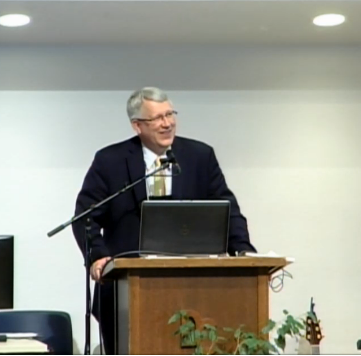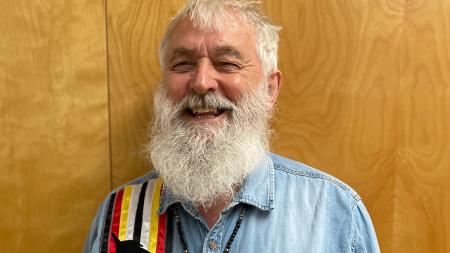Calvin Seminary: 139 Years Old and Still Growing

Since its founding in 1876, Calvin Theological Seminary (CTS) has been teaching leaders for the Christian Reformed Church. But, as delegates to Synod 2015 heard, the seminary is expanding this mission in interesting new directions.
In a presentation to synod, Rev. Jul Medenblik, the president of CTS, described new ways in which the seminary is engaging, equipping and empowering the church today, both in North America and worldwide.
He started by describing how, through its Distance Education program, Calvin Seminary is engaging with pastors in the places where they are, offering degrees in the M.Div., M.T.S. and, starting this fall, M.A. programs.
A video titled “Where You Are” highlighted the purpose of distance education, namely, to enroll in a seminary degree program without moving to its campus in Grand Rapids, Mich. Now, prospective students can continue to live, work and minister where they are and still get the spiritually deep and academically-respected professional Masters’ degrees offered by Calvin Seminary, Medenblik told delegates.
Since the program was launched in the fall of 2013, more than 50 men and women are now enrolled in distance learning at CTS.
Most students have a few more years of studies to complete, Medenblik noted, but he introduced delegates to transfer student Chad Van Ginkel is one of two M.Div. graduates to complete his degree in 2015 through the distance learning platform and be declared a candidate as minister of the Word in the CRC by Synod 2015.
As the youth pastor of Faith CRC in Sioux Center, Iowa, it was a short drive for Van Ginkel to come to Dordt College campus — where Synod 2015 met — and join Medenblik at the podium. Van Ginkel described being a youth pastor for more than 17 years and being encouraged to obtain more training, but having ministry obligations and family responsibilities as a husband and father of four daughters that kept him in Sioux Center.
He said that even though he had begun a distance degree program at another seminary, when Calvin launched its program he quickly transferred.
What he found at Calvin Seminary was affirmation of his identity as a pastor, he said. He also appreciated the challenge in academics as well as the support of his professors that helped to form him for successful ministry.
Throughout his experiences, Van Ginkel said, he found fellowship with his fellow distance learners—brothers and sisters in faith also called to serve the church.
“Equip” was the next ministry marker Medenblik showcased, telling the story of how a class for Hispanic pastors in West Michigan grew into a “world class” certificate program in Hispanic Ministry.
The dream was slow, taking over 10 years to become reality, he said, describing how New Testament Professor Mariano Avila, with the blessing of Academic Dean Ronald Feenstra as well as generous foundation and funding, offered a course in Spanish on Ephesians whose theme is the unity of the church as the body of Christ.
About 40 Hispanic pastors, many of them bi-vocational and without formal theological education, took part in the course. Delegates heard that, week by week, the teachings helped to break down walls of competition and even jealousy within the group to forge bonds of trust and support. Eight more courses were offered over the next several years and the certificate program was birthed under the directorship of Avila.
At Commencement 2015, 36 pastors received Calvin Seminary Certificates in Hispanic Ministry. Six of the graduates are planning to apply their credits toward a degree program at Calvin Seminary. Because of the success of this pilot, a second cohort has been launched making it possible for 40 additional pastors to participate in the program.
In a video tribute produced by “Gatherings of Hope,” delegates heard about the “ripple effect” impact that Avila and this program have had. Participating pastors testified that as they gained in improved abilities to teach and preach the Bible, their churches also gained in a deeper understanding of the gospel and its grace.
To illustrate how CTS is empowering, Medenblik described a program that aims to bring Christian higher education to those without power—inmates living behind the bars of Michigan prisons.
The program, a partnership between Calvin Theological Seminary and Calvin College called the Calvin Prison Initiative (CPI), was started in response to the request of the Michigan Department of Corrections (MDOC) and its director Daniel Heyns in an email he sent to Medenblik in December 2013. Less than 18 months later, a B.A. degree in Christian Leadership was conceived and approved by the faculties and board of the college and the seminary as well as
MDOC. The program is scheduled to launch in this fall.
Medenblik told synod that the story began with trips by seminarians to Angola Prison in Louisiana, largest U.S. maximum security prison, where they learned that, over the past 20 years, God’s Spirit has used the transforming power of seminary education to transform a place once known as the “bloodiest prison in the South” into a place where churches and services have multiplied and violence is down by 85 percent.
CTS Professor John Rottman described to synod how he had been “roped into” going to Angola the first time by then Pastoral Care Professor Ron Nydam. He regaled the delegates with colorful stories of how his encounters with Angola Prison, leading student trips there each January, has changed his heart.
Rottman urged delegates to get involved in prison ministry and prison congregations whenever possible. He also asked them to pray for the Calvin Prison Initiative and for the churches that are forming behind prison bars.
Medenblik wrapped up his 20-minute testimony by telling synod that Calvin Seminary is being changed by the prison ministry, Hispanic ministry and distance education. “...We hope this is serving the church and serving you,” he said. “To God be the glory!”
Synod president Rev. Bruce Persenaire said he was both surprised and delighted with the report and took the opportunity to underscore that these highlights of Calvin Seminary are highlights of what the Christian Reformed Church is doing.
Persenaire challenged delegates to encourage young—and not so young—men and women by “tapping them on the shoulder” to consider Calvin Theological Seminary for ministry training.
Click on this link to watch a video of the CTS presentation to Synod 2015. The presentation begins at about the 34-minute mark.
For full coverage of Synod 2015, including stories, video recordings, photos and more visit www.crcna.org/synod.


